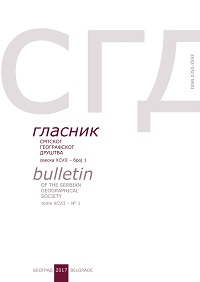Possibilities and Limitations of Тerritorial Cooperation Among Serbian and European Тоwns
Possibilities and Limitations of Тerritorial Cooperation Among Serbian and European Тоwns
Author(s): Zora Živanović, Branka TošićSubject(s): Government/Political systems, International relations/trade, Rural and urban sociology, EU-Approach / EU-Accession / EU-Development
Published by: Српско географско друштво
Keywords: town; transborder cooperation; isolation; possibilities; South-Eastern Europe; Serbia;
Summary/Abstract: This paper deals with the significant European aims of the process of intra-continental integration, as well as the role of the urban centers in its trans-regional cooperation. Although the process of trans-border cooperation of towns exists also in other parts of the world, the roots of that complex form of cooperation appeared rather early in Western Europe. The area of Central Europe, especially the politically unstable southeastern part of the continent, are considerably late in this process. Serbia, especially its western and southern parts, is even more late in trans-border regional cooperation of towns. The paper emphasizes that towns of Serbia, as development carriers with their intellectual potentials, have to express the ideas on starting the international actions. The possibilities are extensive: activation of neglected cooperation relations, improvement of technological and economical development, modernization of infrastructural systems, cooperation in culture, education, sports and recreation, environmental protection, etc. Towns need to find the ways for all kinds of cooperation with surrounding towns, if such cooperation gives the results which are favourable for both parties. Isolation from the world courses would lead to long-term stagnation.
Journal: Гласник Српског географског друштва
- Issue Year: 93/2013
- Issue No: 3
- Page Range: 11-34
- Page Count: 24
- Language: English

